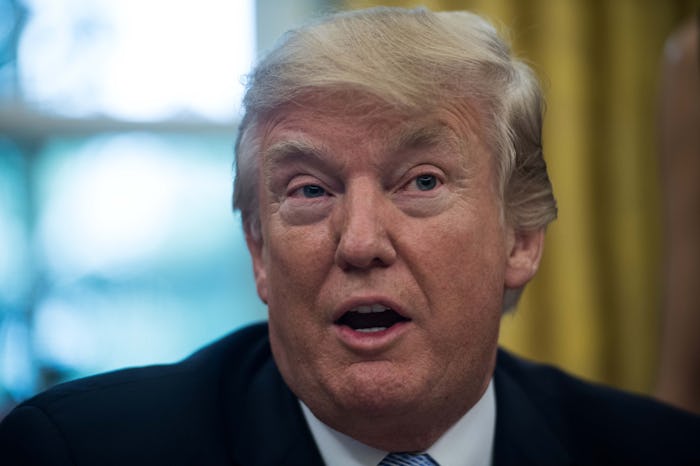News

Donald Trump’s DACA Statement Shows How Little He Knows About DACA
On Tuesday, President Donald Trump formally announced that his administration would be rescinding an Obama era policy, Deferred Action for Childhood Arrivals, which gave immigrants illegally brought to the United States as children a legal avenue to staying in the only country they knew. During the announcement, Trump made an attempt to explain why removing DREAMers from the United States would benefit Americans — but Trump's DACA statement only proves how little he actually knows about the program.
"As President, my highest duty is to defend the American people and the Constitution of the United States of America," Trump said on Tuesday, according to CNBC. He continued:
At the same time, I do not favor punishing children, most of whom are now adults, for the actions of their parents. But we must also recognize that we are nation of opportunity because we are a nation of laws.
There's the very first problem with Trump's statement — because by rescinding DACA, Trump is most definitely punishing children for the actions of their parents. DACA is not some catch-all program that allows any and all immigrants to suddenly remain legally in the United States. In order to be eligible for the program, applicants had to have been brought to the country as children (under 16 years old), and they couldn't have any felonies or significant misdemeanors on their record.
Immigrants who have stayed in the United States thanks to DACA arrived in the country because their parents made the choice to come and stay illegally — a choice that, as children, DACA applicants had zero say in. And before President Obama introduced DACA, many of those immigrants had to live in the shadows thanks to their parents' decisions, living illegally in the only country they knew.
However, thanks to DACA, nearly 800,000 immigrants came forward and gave all sorts of information (including names, addresses, work and school information, and proof of their status) to authorities as part of their DACA applications. Now that Trump is rescinding DACA, U.S. Immigration and Customs Enforcement officers will be able to request that information from the Department of Homeland Security if necessary — and then use it to deport an immigrant formerly protected by DACA. How is that not punishment?
As part of his statement, Trump emphasized how DACA would be phased out, explaining:
The Department of Homeland Security will begin an orderly transition and wind-down of DACA, one that provides minimum disruption. While new applications for work permits will not be accepted, all existing work permits will be honored until their date of expiration up to two full years from today. Furthermore, applications already in the pipeline will be processed, as will renewal applications for those facing near-term expiration. This is a gradual process, not a sudden phase out. Permits will not begin to expire for another six months, and will remain active for up to 24 months. Thus, in effect, I am not going to just cut DACA off, but rather provide a window of opportunity for Congress to finally act.
The thing is, that phase-out would leave some some DREAMers unprotected as early as March 6, 2018, with no way to renew their legal status. DREAMers came forward with their information because they trusted the government when it promised that they could legally remain in the United States if they met criteria. Would they still have given up that information if they knew DACA would no longer be an option five years later?
Trump's statement on DACA makes it seem like he's pursuing a reasonable, slowly implemented process that will help the American people. The reality, however, is that some 800,000 people in the United States will now be forced to decide what they'll do when they — suddenly, and once again through no fault of their own — become undocumented and "illegal" in the country they grew up in.